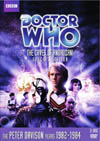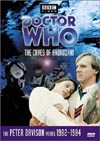"Special Edition" DVD Extras (on 2 discs, no less) include:
First ImpressionsAround the time of Androzani's first debut here on TVOntario in early 1987, I looked back at what the season had delivered so far, and thought that the show, and Peter Davison's Doctor, were getting really, really good, and improving nearly all the time.However, "The Caves of Androzani" turned out to be a slow and uninteresting interlude in his current excellent streak. I didn't see or find any reason to anticipate important characters in this one, or any events taking place that were important to the Whoniverse. Ah well, we'll just sit tight during this story, and hopefully get a better Peter Davison story after it, I thought...... The name "Robert Holmes" seemed vaguely familiar. Though I definitely had no memory of his writing credit on the first story I ever saw, "The Ribos Operation" (story no. 98), which at the time was the only story of his that I had seen, I dug through my collection of novelizations and confirmed that he had written "The Ark in Space" (story no. 76), which I hadn't been particularly impressed with in book form as it seemed slow and unnecessarily morbid. "Androzani" didn't seem to be much improvement.
Fresh AssessmentOn the plus side, you have to hand it to director Graeme Harper and his cast and crew for doing good hard work and making something that is often tense, often exciting and often atmospheric out of basically a misfocused script with a rubbish storyline for the Doctor. But in the end, the collection of bloodthirsty, self-centered characters that take over this story aren't really worthy of their inflated screen time, painting an excess of violence and action cliché to keep the audience mindless and glued to their seats. Philosophically speaking, there is almost nothing here to impress.But, buried deep in this cesspool, there is a hidden gem of an idea. Holmes seems to understand corruption like the back of his hand, particularly how it operates at the highest level. He does create a structure for the relationships his guest characters have with each other that nicely details the way in which the truly corrupt often plan to profit from conflict, secretly supporting both sides as necessary to further their interests. Davros gave us a few manoeuvres of this type in "Genesis of the Daleks" (story no. 78), but the situation here is interesting because it has been set-up to last over a much longer term. But "The Caves of Androzani" still does not capitalize on this idea well. The storyline should let the Doctor be the Doctor, who would naturally investigate, expose, comment on, and put an end to this scheme, thus drawing viewer attention to the most interesting aspect of the narrative. That could have drawn proper attention to the dynamics, perhaps helped the audience wake-up to this pattern that commonly threatens our sociological structures today, and actually have done society some good in bringing this story to the screen. Instead Holmes wastes too much time giving us the dramatic inertia of simply going on and on about who his characters are, until he hasn't got time left to move the plot properly anymore. We will dissect that in much greater detail in the in-depth analysis version of this review along with all the spoilers you wouldn't want to know if you haven't seen the story yet. Holmes seems to have fallen into a similar trap with his season four Blake's 7 script "Traitor". Peter Davison is also keen to say in interviews and on commentaries that he thinks this story finally got a good sense of pace from the director Graeme Harper. As far as I was concerned, the script wasn't moving at any great pace at all.
The Lack of the Best of Peter Davison's DoctorWith such a whacking great flaw in how the storyline fails to utilize the Doctor properly, you have to wonder what is going on in the mind of anyone when they think Peter Davison only finally got his character right in this story. I look at this, and I can't find his character here at all. At least, not the character I tuned in to see. Granted, his first conversation with General Chellak gave me a flashback to all the scenes Jon Pertwee had clashing ineffectively with officials, stuffy people, and anyone else he considered too slow. Emphasis on "ineffective", because it wasn't much good back in those days either. Indeed, watching Davison get slapped around each time he cheerily utters some flippant remark is not my idea of how to make this character work.Perhaps people latch onto the line "Curiosity has always been my downfall," thinking that, yes, that really sums up the Doctor. Or the fifth Doctor. What a load of crap. Curiosity and heroism are the two traits the Doctor has that consistently drive good science fiction story beats. Downfall? Try excellence. Part of the reason why this story stinks is that the Doctor's curiosity dries up long before it has exposed the corrupt conspiracy properly for the viewer, and because the Doctor's heroism does not effectively extend further than his current companion's welfare. It's also important to note how often the Doctor passes up excellent opportunities to do much, much better in this story. As I'm trying to hold back spoilers, I'll just say this: As a storyline, "Androzani" really loses it at the start of episode three. Think about what has happened so far, and what the Doctor then chooses to do during this section of the tale. Ask yourself if it makes sense. Ask yourself if writer Robert Holmes could really not think of anything better to give him to do. Ask yourself if this really shows the fifth Doctor at his best. Ultimately, my biggest reason for not counting this as a great Doctor Who story is because it isn't really a Doctor Who story at all. It's a story about some other people and the Doctor just happens to float through it with minimal impact. Of course, the real debate is not whether or not these things could plausibly happen to the fifth Doctor and Peri. The debate is really about whether or not it's worthwhile to put cameras on long pace-less sections of such incidents and try to make four episodes out of it, or to spend more time showing the times when he actually moved around freely interacting and actually doing things. In the case of "The Awakening" (story no. 132), it was decided that cameras would NOT hang around for four episodes; they would instead only hang around for two. Ultimately, you will have to look elsewhere to see Peter Davison at his best as the Doctor, and in terms of really nailing all the best qualities of the character in one story, I think we will truly find Davison at his best in "Frontios" (story no. 133). It is there that I find his positive philosophies and actions at their most satisfying levels.
The Un-Sci-Fi DramaThere's really not much in this tale to stamp it as sci-fi either. Yes, it's an alien planet, with mudbursts instead of volcanic activity, and that's all good. The series is about to be stuck in a succession of desert planets though, with all the quarries used to realize this having little chance of outdoing the excellent Lanzarote footage from the last story: "Planet of Fire". Still, they have a valiant go at producing some good vistas here. Really, I find this story's setting VERY reminiscent of Holmes previous Doctor Who script, "The Power of Kroll" (story no. 102), with a futuristic Earth colony on a big major planet exploiting the resources of a companion minor planet. Just substitute mud-desert for marshy-swamp, and bat-produced spectrox for sea-life-produced protein. Even if the guest characters of "Kroll" aren't drawn quite as satisfyingly as here in "Androzani", the plot was far better, allowing the Doctor to get a good grip on events and become a more integral part of them, plus it all linked into the Key to Time arc and held up as being a more important event in the Whoniverse. And it was so easy to root for the refinery crew when they were faced with the unknown of Kroll stirring up beneath the swamp, and when they were investigating it as phenomena should be investigated in science fiction. Even without "Kroll" being one of Robert Holmes' really great stories, I have to say I think it was miles better than what he wrought here.Pretty much the only real sci-fi concept explored in this story is that of the life-prolonging spectrox extract, which only remains a minor piece of background. A true exploration of life-prolonging phenomenon should include mental disciplines, emotions, habits, and behaviours, and not all be put down to some substance to be ingested. So that subject isn't really tackled to great extent. Really, spectrox is just there as a substitute for oil, diamonds, opium, (Kroll protein), and any other commodity that gave the highest powers an excuse to set up profitable conflicts in the unique areas in which they were found. Perhaps most obvious for something that wants to function as a sci-fi action story, why are we witnessing futuristic humans who have colonized other worlds using bullets and today's submachine guns? Where are the lasers? It's so un-sci-fi, it can't hope to qualify as delivering the action I would want to see from the show. This appears to have been a deliberate Graeme Harper choice, removing part of the series' draw for me, so it will eat into his marks as a director. Granted, if "Warriors of the Deep" (story no. 131) and "Resurrection of the Daleks" (story no. 134) are any indication, trying to do massive shootout action with superimposed beams seems to have been something that the show's post-production of that era would rarely find time to do properly, so he has a point there. But Graeme Harper's "Planet of the Ood" (story no. 196) will later suffer the same flaw without these post-production concerns, so in many ways it is a question of taste. At least Harper's "Revelation of the Daleks" (story no. 143) sports a mix of the two types of weapon effects. Peter Grimwade was better at insisting to push the envelope, and getting lots of good post-production effects for the time for "Earthshock" (story no. 122). If such things are deemed to consume far more time than will be available, the next best thing would be flash-charge pistols à la "The Monster of Peladon" (story no. 73). At least they still look futuristic and sci-fi.
Really, a character of Jek's type is typical for this role in the structure of the high-level corruption game that is being played out, along with his feelings of being wronged by someone against whom he desires vengeance. This is a known quantity and should be passed by quickly in favour of investigating the game itself and those at the highest level. This the story doesn't do very well. On some level, it almost appears like the entire guest cast, Jek included, is each caught up in their own variation of passive-aggressive syndrome, but not quite. Most of them are hardly passive at the beginning of the story; they are deadlocked against each other instead. But I think it looks enough like passive-aggressive syndrome, and is filled with enough mercenaries, to get Eric Saward to give it the green light, no editing attempted. Holmes always did seem to have the knack of pleasing his script editors and producers, and rolling with whatever the current direction of the program was.
Although we didn't know it until at least another week, this is probably also the moment that the Doctor burst out of the passive side of the arc that Saward was crafting for him, and onto the aggressive side. But that's an examination for another era.......
Season 21 Peter Davison Story Rankings:
This story has become available on DVD and VHS video.
Comments on this article are welcome. You may contact the author from this page:
|
|||||||||||||||||||||||||||||||||||||||||||||||||











